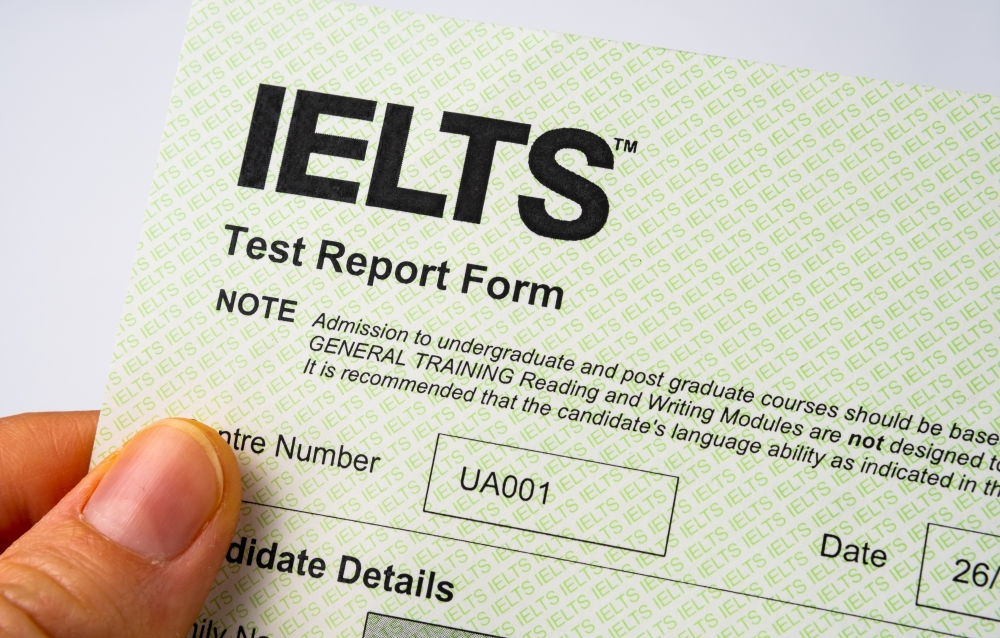A score of seven or higher on the IELTS exam is a goal for a large number of our students. To help you with this, we have a video conversation between IELTS coach Adrian (founder and president of AcademicEnglishHelp, General IELTS Test Help, and TOEFL Test Help) and expert speech therapist Esther Bruhl (founder of Speak More Clearly and creator of the Speak More Clearly online accent training courses). The experts address problems students encounter and share tips for overcoming common issues so you can get the best score possible on your IELTS exam.
Throughout the blog post, we will reference time stamps from the video of specific topics so you can move to the sections that interest you the most.
What Does It Take to Get a Seven, Eight, or Nine on Your IELTS?
The evaluating criteria for the IELTS speaking test are:
- Fluency and coherence
- Lexical resource
- Grammatical range and accuracy
- Pronunciation.
To get a higher level IELTS score, you must show English proficiency and have a good understanding of these elements of English.
(4:14)
How Can I Overcome Anxiety When Taking the IELTS?
Feeling a bit nervous before you take the IELTS exam is natural. However, too much nervousness can hamper your results. One of the best ways to move beyond your anxiousness is to move your mouth more.
This is because everything tends to tighten when a bout of nervousness hits. The tightness causes words not to flow naturally. You can hold back your fear and speak your best by moving your mouth more.
(6:18)
Additionally, specific breathing techniques can help give you a sense of calmness. Your muscles will relax, and you will have plenty of oxygen in your system. The video offers examples of relaxation breathing techniques for you to try.
(12:05)
How to Move Your Mouth to Speak More Clearly in English
As you may have noticed, English is an animated language. To sound like a native speaker, you may need to learn to be more dramatic. Moving your mouth more when you speak will help with this.
Practice exaggerating mouth movements in the mirror so that you get used to speaking this way.
Additionally, it may help if you imagine the examiner is your grandparent. You must speak in complete sentences for a grandparent to understand you. Moving your mouth more and dramatic speaking can help. You can see examples of this in the video.
(7:40)
How to Use Pauses and Phrasing to Sound Like a Native English Speaker
Grouping words in phrases and pausing are both common traits of English speakers. Together they allow your listeners to comprehend what you are saying and give you a moment to catch your breath.
(12:47)
How to Use Stress and Intonation to Sound More Natural When Speaking
English speakers emphasize the words that give the primary meaning in a sentence. Mastering this is vital to your success when taking IELTS.
Notice how the same sentence has a slightly different meaning based on what is emphasized.
Owning a dog is so much FUN. (The speaker gets enjoyment from their dog)
Owning a DOG is so much fun. (The speaker prefers dogs over other pets and enjoys having one)
When you use the correct emphasis, your listeners will understand your meaning, and you will sound more like a native English speaker.
(16:08)
What is in Speaking Part Two of the IELTS Exam?
The ‘Speaking Part Two’ part of the IELTS exam is a long section. There will be a cue card portion in this section. The cue card has a question, and the speaker must speak about the question spontaneously for two minutes.
IELTS expert Adrian explains more about ‘Speaking Part Two’ of the exam in the second installment of the video conversation between IELTS coach Adrian and speech therapist Esther Bruhl.
(15:05)
In part two of the video conversation between IELTS coach Adrian and speech therapist Esther Bruhl. In this section of the video, the experts discuss the common English speech problems that most IELTS students encounter and how to avoid them to get a better speaking score for the IELTS test. In the video, you will find many IELTS speaking tips.
What Can Students Do to Reduce Stammering and Stuttering?
These are common problems that can be overcome. The best way to correct these speech problems is to enlist a speech pathologist to help. If this is not an option for you, increase your practising. The more you know your material, the more calm and confident you will become. This will reduce stuttering and stammering.
(1:01)
Esther Shares Other Speech Problems Her Speak More Clearly Students Encounter
Working with Speak More Clearly students for so long, Esther has seen these two problems frequently.
- In a person’s original language, they do not have particular consonants or vowels. This makes it harder to learn those sounds in English.
- Some students struggle with cluttering, which is essentially a rhythm problem. This happens because areas in the brain that allow you to pace your rhythm are not working as they should. Because English is a stress-timed language, this is vital.
(3:42)
Tips to Reduce Cluttering
An excellent way to reduce cluttering is to make your vowel sounds longer. Another tip is to take in enough air before you speak so you can say the phrase or sentence. Then you don’t have to rush to get to the end (because you are running out of breath) and clutter your speech. For success on your IELTS exam, you must master this.
(5:17)
How You Can Emphasize Vowel Sounds Like a Native Speaker
The long-sounding vowel sounds in English often make students uncomfortable, as emphasizing the sounds feels unnatural. However, it is essential to master this to sound like a native speaker.
(6:21)
Esther Gives Her Professional Opinion on the Use of Natural Fillers
Natural fillers are a frequent source of contention among IELTS students. Esther believes that natural fillers are acceptable in moderation but using them too often will disrupt the flow of conversation.
(7:35)
How Active Listening Can Help Improve Your IELTS Score
The video covers how you can use active listening as a tool to improve your test score. When you are actively listening, you are mindful of what other speakers are saying and how they are speaking. This can be a great tool to help you in the IELTS.
(14:16)
Additionally, you can learn how active listening can help you change your speech faster.
(15:27)
Thoughts and Suggestions from Esther
Having spent many years helping to perfect students’ speeches, Esther shares some of her expert suggestions to help you pass the IELTS exam.
(17:25)
How to SPEAK ENGLISH CLEARLY in Three EASY STEPS- click here to get your free video on how to speak clearly in English in just three steps.
Follow Adrian:
- Websites: https://www.aehelp.com/ | https://www.gieltshelp.com/
- Youtube: https://www.youtube.com/c/Aehelp/videos
Subscribe to get more free: https://www.youtube.com/@speakmoreclearly1
Follow us for more free tips on Facebook: https://www.facebook.com/speakmoreclearly


